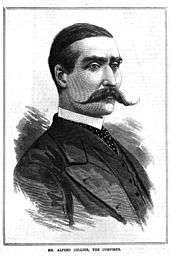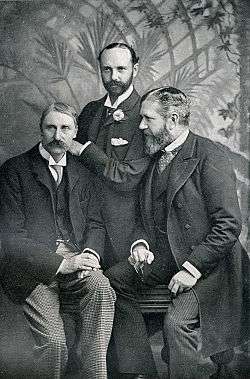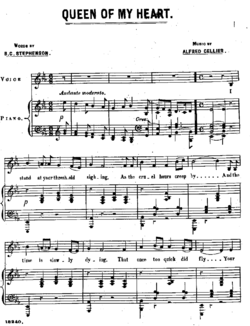Alfred Cellier

Alfred Cellier (1 December 1844 – 28 December 1891) was an English composer, orchestrator and conductor.
In addition to conducting and music directing the original productions of several of the most famous Gilbert and Sullivan works and writing the overtures to some of them, Cellier conducted at many theatres in London, New York and on tour in Britain, America and Australia. He composed over a dozen operas and other works for the theatre, as well as for orchestra, but his 1886 comic opera, Dorothy, was by far his most successful work. It became the longest-running piece of musical theatre in the nineteenth century.
Biography

Cellier was born at Hackney, in London. His parents were Arsène Cellier from France, a professor of languages at Hackney Grammar School, and his wife Mary Ann. He was educated at the grammar school in Hackney. From 1855 to 1860, he was a chorister at the Chapel Royal, St. James's, under the Rev. Thomas Helmore, where Arthur Sullivan was one of his schoolmates.[1] Cellier later married Harriet Emily.[2] Cellier's brother, François, also became a conductor.
Early career
Cellier's first appointments were as organist at All Saints' Church, Blackheath and as conductor of the Belfast Philharmonic Society (both in 1862). In 1866 he succeeded Dr. Chipp as organist and director of the Ulster Hall concerts, Belfast, at the same time acting as conductor of the Belfast Philharmonic Society. In 1868 he returned to London as organist of St. Alban's, Holborn.[3] In January 1871, Cellier became the first conductor and music director at the Royal Court Theatre in London.[2] From 1871 to 1875 he was conductor and music director at the Prince's Theatre, in Manchester.[3]
During this period he composed many comic operas and operettas, the most successful of which was The Sultan of Mocha, produced at Prince's Theatre, Manchester, in 1874 (revived in London in 1876 and 1887 (with a new libretto) and in New York in 1880, among others).[4] Another success was Charity Begins at Home (1872 at the Gallery of Illustration), with librettist B. C. Stephenson.[5] The piece was played more than 200 times.[6] He also wrote numerous separate songs and composed for orchestra (including his Symphonic Suite) and the piano, of which his Danse pompadour achieved particular popularity. His stage works, however, were more successful than his serious concert music.[2] Most of Cellier's early works for the theatre, however, including Topsyturveydom (1874, with a libretto by W. S. Gilbert), The Tower of London (1875, Manchester), Nell Gwynne (1876), Two Foster Brothers (1877, St. George's Hall, with a libretto by Gilbert Arthur à Beckett), and Bella Donna (1878), had only modest success.[1]
D'Oyly Carte years

In December 1877 Cellier joined the D'Oyly Carte company as musical director at the Opera Comique in London. There he conducted The Sorcerer (1877), H.M.S. Pinafore (1878, for which he wrote the overture, based on themes from the opera),[7] Trial by Jury (1878), George Grossmith's Cups and Saucers (1878–79), and three of his own one-act works: Dora's Dream (1877–78 revival), The Spectre Knight (1878), and After All! (1878–79).[1] Cellier was conducting the performance of Pinafore during which the partners of The Comedy Opera Company attempted to repossess the set, and he was noted for his attempts to calm the audience during the fracas.[8] His brother, François, succeeded him as musical director at the Opera Comique in 1879. Alfred Cellier was a conductor of a series of promenade concerts at the Queen's Theatre, Long Acre and, in 1878–1879 he was joint conductor, with Sullivan, of the Covent Garden Promenade Concerts.[3]

In 1879, he travelled with Gilbert, Sullivan, and Carte to America, where he acted as conductor for Pinafore and The Pirates of Penzance, with Carte's first American touring company. Cellier prepared the overture to Pirates using Sullivan's music from the rest of the score.[9][10] Back in London in July 1880, he directed the music at the Opera Comique for Pirates and another of his own pieces with Desprez, In the Sulks. In April 1881, he left the D'Oyly Carte company, ceding the baton to his brother. Cellier composed a three-act grand opera, Pandora, a version of Longfellow's The Masque of Pandora (with a libretto by B. C. Stephenson) that was presented in Boston in 1881.[11] He returned to America later that year as music director of D'Oyly Carte's New York and touring productions of Billee Taylor (1882), Les Manteaux Noirs and Rip Van Winkle (both in the fall of 1882), and Iolanthe (1882–83), for the latter of which he prepared the New York overture.[1]
In 1883, Cellier's setting of Gray's Elegy, in the form of a cantata, was produced at the Leeds music festival.[9] In 1883, Cellier left the D'Oyly Carte company, but he was back for brief periods as music director with D'Oyly Carte's touring companies for Princess Ida (1884) and The Mikado (1885). In 1885, also, Cellier composed incidental music for a production of As You Like It. He composed two more companion pieces that had Savoy Theatre premieres: The Carp (performed with The Mikado and Ruddigore in 1886–87), and Mrs. Jarramie's Genie (composed together with his brother François, with libretti by Desprez, which played together with several different operas at the Savoy between 1887 and 1889).[1]
While in London, Cellier conducted at several London theatres, including the Criterion, the St James's, and the Savoy. Later, as a result of ill health, he resided abroad, notably in America and Australia, where he was a representative for the D'Oyly Carte company.[2]
Dorothy and later pieces

In 1885, Cellier had composed a song, "There once was a time, my darling", for a piece produced by George Edwardes, Little Jack Sheppard (1885). In 1886, for Edwardes, Cellier wrote his greatest success, the score to the comic opera, Dorothy, with a libretto by B. C. Stephenson, which opened at Edwardes's Gaiety Theatre on 25 September 1886, receiving lukewarm notices. To create the score, Cellier repurposed some of his music from his 1876 failure, Nell Gwynne, which had, nevertheless, received praise for its music.[3] Neither the music nor the libretto of Dorothy initially attracted critical praise. The Times wrote, "Gentility reigns supreme, and with it unfortunately also a good deal of the refined feebleness and the ineptitude which are the defects of that quality."[12] Stephenson and Cellier revised the work, and it transferred in December to the Prince of Wales Theatre with new stars, including Marie Tempest. Dorothy became a great success at the box office and transferred in 1887 to the Lyric Theatre, where it ran until 1889. Its initial run of a total of 931 performances was the longest of any piece of musical theatre up to that time,[13] running longer than even The Mikado, a fact that caused consternation to Cellier's friend Arthur Sullivan. Some critics reconsidered their earlier condemnation, the work became regarded as a classic Victorian piece,[14] and the initially despised plot was traced seriously back to the Restoration playwrights David Garrick and Aphra Behn, and to Oliver Goldsmith and even Shakespeare.[15] Its success led to revivals of some of Cellier's earlier works.[16]
Cellier also toured in Australia between 1886 and 1888, conducting The Mikado, Dorothy and other works. His last operas, Doris (1889, with Stephenson) and The Mountebanks (with Gilbert, produced in January 1892, a few days after the composer's death), were both modestly successful.[1] Also after Cellier's death, Rutland Barrington used some of his music in his 1902 adaptation of Water Babies. Often in ill health throughout his life, Cellier was unable to finish The Mountebanks, and Ivan Caryll completed the score.
Cellier owed much to the influence of Sullivan. He was a fertile melodist, and his writing exhibited elegance and refinement, although he was not able to infuse his music with humour in the way that Sullivan did.[3]
Cellier died at his home in Bloomsbury, London and was buried in West Norwood Cemetery.[2]
Major works
In addition to numerous songs and piano pieces, Cellier composed these major works:
Operas and musical comedies
- Charity Begins at Home (1872)
- Dora's Dream (1873)
- Topsyturveydom (1874)

- The Sultan of Mocha (1874)[4]
- The Tower of London (1875)
- Nell Gwynne (1876)
- Two Foster Brothers (1877)
- The Spectre Knight (1878)
- Belladonna, or The Little Beauty and the Great Beast (1878)
- After All! (1878)
- In the Sulks (1880)
- Pandora (1881 grand opera)
- The Carp (1886)
- Dorothy (1886)
- Mrs. Jarramie's Genie (1888)
- Doris (1889)
- The Mountebanks (1892)
Incidental music to plays
- Les manteaux nois (1882)
- As You Like It (1885)
- The Water Babies (1902)
Orchestral and other works
- Gray's Elegy (1883), for chorus and orchestra
- Suite symphonique
- Barcarolle for flute and pianoforte
Notes
- 1 2 3 4 5 6 Stone, David. "Alfred Cellier", Who Was Who in the D'Oyly Carte Opera Company (2001)
- 1 2 3 4 5 Edwards, F. G., rev. James J. Nott "Cellier, Alfred (1844–1891)", Oxford Dictionary of National Biography, Oxford University Press, 2004, accessed 9 October 2008, doi:10.1093/ref:odnb/4989
- 1 2 3 4 5 "Mr. Alfred Cellier", The Times, 30 December 1891, p. 4, col. B
- 1 2 Cellier, Alfred. The Sultan of Mocha. Vocal score at The Gilbert and Sullivan Archive, accessed 11 July 2010
- ↑ Adams, p. 273
- ↑ The Morning Post, 16 November 1872, p. 1; and "Dramatic and Musical Chronology for 1872", The Era, 5 January 1873, supplement.
- ↑ Ainger, p. 157
- ↑ Gillan, Don. "Fracas at the Opera Comique", Stage Beauty website
- 1 2 Scowcroft, Philip L. "A Twentieth Garland of British Light Music Composers", MusicWeb.UK
- ↑ Ainger, p. 177
- ↑ "The Drama in America", The Era, 1 August 1880, p. 5
- ↑ The Times, 27 September 1886, p. 10
- ↑ Gillan, Don. Longest Running Plays in London and New York, 1875 to 1920 at the Stage Beauty website (2007)
- ↑ "Dorothy", The Times, 22 December 1908, p. 11
- ↑ "Things Theatrical", The Sporting Times, 23 July 1892, p. 2
- ↑ Kenrick, John. "Cellier, Alfred", The Cyber Encyclopedia of Musical Theatre, TV and Film
References
- Adams, William Davenport. A Dictionary of the Drama, Chatto & Windus, 1904
- Ainger, Michael (2002). Gilbert and Sullivan, a Dual Biography. Oxford: Oxford University Press. ISBN 0-19-514769-3.
- Ayre, Leslie (1972). The Gilbert & Sullivan Companion. London: W.H. Allen & Co Ltd. ISBN 0-396-06634-8.
- Cellier, François; Cunningham Bridgeman (1914). Gilbert and Sullivan and Their Operas. Boston: Little, Brown and Company.
-
 Edwards, Frederick George (1901). "Cellier, Alfred". In Sidney Lee. Dictionary of National Biography, 1901 supplement. London: Smith, Elder & Co.
Edwards, Frederick George (1901). "Cellier, Alfred". In Sidney Lee. Dictionary of National Biography, 1901 supplement. London: Smith, Elder & Co. - Hyman, Alan (1978). Sullivan and His Satellites. London: Chappell.
-
 This article incorporates text from a publication now in the public domain: Chisholm, Hugh, ed. (1911). "Cellier, Alfred". Encyclopædia Britannica (11th ed.). Cambridge University Press.
This article incorporates text from a publication now in the public domain: Chisholm, Hugh, ed. (1911). "Cellier, Alfred". Encyclopædia Britannica (11th ed.). Cambridge University Press.
External links
- Johnson, Colin M. Victorian and Edwardian Light Operas site, including links to lyrics, MIDI files and cast lists for a number of Cellier works
- Listing of Cellier shows at MusicalTheatreGuide.com
- Dorothy at the British Musical Theatre site of The Gilbert and Sullivan Archive (2005)
- Information about Savoy curtain raisers at The Gilbert and Sullivan Archive
|